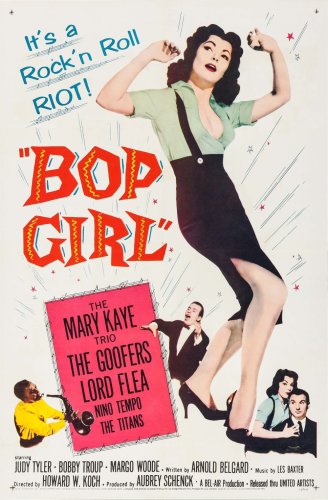

There is absolutely nothing in this ridiculous mess of a film that I find redeeming. From the embarrassingly silly "Hard Rock Candy Baby" number, to the hat-wobbling nonsense-act of Lord Flea, to the pigtails Judy Tyler wears at one point that look like they were braided by a 3-year old.
This is not a "lost movie" but was in fact shown on TCM in March, 2008. It could have stayed in the vaults.
This story is a "B" picture, simply about a rock and roll singer who is told by a professor with a kind of applause meter at a night club tells her that rock and roll is fading out and calypso is the new hot genre of music to pursue. The title character is Jo Thomas, played by Judy Tyler, one of her few roles (she passed away young from a road accident).
We located Columbia Motion Picture by the name of Cha, Cha, Cha, Boom! Please contact Mary Kaye Trio website for updates.
Written by a Scandinavian with the peculiar notion that calypso was about to overtake rock 'n'roll, "Bop Girl Goes Calypso" tells the tale of young club-hopper Bob Hilton (Bobby Troupe), an academic trying to find the singer who will launch the next wave of mass hysteria -- which, according to his applause meter, will be calypso.
I have read a couple of reviews in movies history books,and both seem to agree Bop Girl goes Calypso is a lost movie.....no known copies of the movie are available for evaluation.
It's frantic, man, when a female rock 'n roll singer is nearly convinced by a professor's assistant that rock music is fading, its audience turning instead to the more mature sounds of calypso. Plot-less drive-in kitsch with lots of specialty acts padding the running time.
I don't know how to score this movie. If you're like me, once you start watching it, you'll just sit back dumbfounded by the whole premise that Calypso music could have ever been a serious threat to rock and roll as a popular form of music.
Bill Haley recorded "Rock Around the Clock" in April of 1954. It became a sensation and "rock and roll" became the craze.